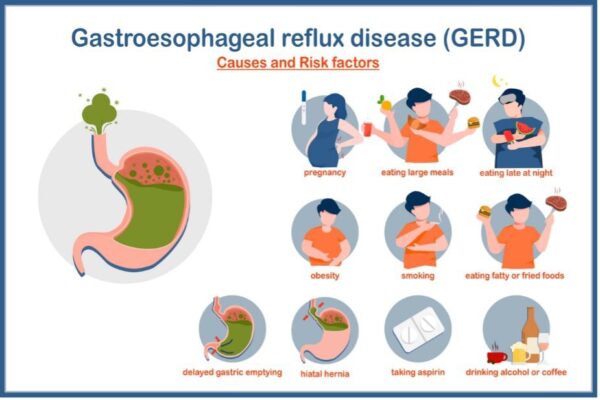
13 Questions to Ask About Acid Reflux – Answers from Acid Reflux Specialists in Denver
Did you know that acid reflux and heartburn are some of the most common digestive conditions? Turns out millions of people worldwide have symptoms related to GERD, (gastroesophageal reflux disease) reported by the National Library of Medicine. According to American College of Gastroenterology, about 20 percent of the US population is estimated to be living with GERD.
Even though we talk about acid reflux and heartburn like it’s no big deal, there’s still confusion about the meaning of these terms, common causes and how to get relief. This blog will answer some common questions about acid reflux, heartburn and offer treatment options for you to consider.
Let’s dive into the burning questions about acid reflux and GERD so you can improve your gut health.
1. What is Acid Reflux?
Kelly Zucker, DO, board-certified gastroenterologist with Gastroenterology of the Rockies would like to clear up some confusion about heartburn and GERD. Dr. Zucker has expertise in acid reflux, GERD and heartburn.

For starters, Dr. Zucker says heartburn is considered a symptom, whereas GERD is a true digestive condition.
“Heartburn is a burning sensation in the chest or upper abdomen usually caused by regurgitation of acid reflux from the stomach into the esophagus,” said Dr. Zucker. “Heartburn is common and nearly everyone has some degree of heartburn, depending what you eat, certain lifestyle factors, and if you lay down right after a meal.”
Dr. Zucker doesn’t get too concerned when patients have occasional heartburn. She’s more concerned when her patient’s heartburn occurs regularly and turns into GERD—because of the damage it can cause.
“When persistent regurgitation of stomach contents is in the esophagus, it can lead to chronic symptoms and complications. The main symptom is typically heartburn, but it doesn’t always have to present as traditional burning in the chest or abdomen. Symptoms [of acid reflux] generally occur more than two times per week and they are troublesome enough to bother day-to-day life,” said Dr. Zucker.
2. What are Common Symptoms of Acid Reflux?
Acid reflux is characterized by irritation in the food pipe or esophagus—which is caused by corrosive stomach acid or bile. This can happen when there’s a weakening of the lower esophageal sphincter (LES), a ring of muscle at the bottom of your esophagus. When this happens, stomach contents and acid flow up into the esophagus—and it causes the discomfort we call heartburn.
- Heartburn: A burning sensation in the chest or throat, commonly happens after eating or lying down.
- Regurgitation: Sour taste in the mouth, usually after meals.
- Difficulty swallowing: Food feels stuck in your throat or chest.
- Coughing or wheezing: Persistent cough or hoarseness—common in the morning.
- Chest pain: Not necessarily linked to heart issues, but also considered a common symptom.
While acid reflux is common for some people, increased frequency of acid reflux can become a more serious condition known as GERD (Gastroesophageal Reflux Disease).

3. What is GERD?
GERD is a more severe, chronic form of acid reflux. Generally, acid reflux could occur occasionally, whereas GERD refers to acid reflux that happens more than twice a week. And with its ongoing frequency, it can cause persistent discomfort or damage the esophagus.
4. How Does GERD Differ from Acid Reflux?
Key Differences Between Acid Reflux and GERD:
- Frequency: Acid reflux may happen occasionally, compared to GERD which is a chronic condition.
- Severity: GERD can cause more serious complications, symptoms or damage
- Example: Esophageal damage, narrowing or ulcers.
- Complications: Left untreated, GERD may lead to Barrett’s Esophagus, a condition that may increase the chance of esophageal cancer.
Are you experiencing heartburn or acid reflux more than twice weekly? Then perhaps it’s time to discuss it with an acid reflux specialist who can rule out whether it’s a sign of GERD.

5. What is Barrett’s Esophagus?
Barrett’s Esophagus – When there’s continual acid exposure, the lining in the esophagus starts to change. When cells in the esophagus become more like cells in the intestines, it may put some people at increased risk of esophageal cancer.
According to research, about 5 percent of people with chronic GERD are at higher risk of developing Barrett’s Esophagus. This is why it’s essential to manage acid reflux symptoms and seek medical attention if you experience frequent heartburn, acid reflux or GERD.
6. What Causes Acid Reflux and GERD?
We know that acid reflux is generally triggered from a combination of lifestyle choices—plus diet and medical conditions are contributing factors. So we reached out to another acid reflux specialist here at Gastroenterology of the Rockies, Dr. Sim Bedi, board-certified gastroenterologist.
“If you have a personal history of hiatal hernia, this could increase your risk of developing acid reflux,” said Dr. Sim Bedi. “People with a hernia may experience symptoms like chest pain, difficulty swallowing, heartburn and regurgitation.”
Hernia size matters. People with a larger hiatal hernia are at increased risk of developing acid reflux, Dr. Bedi added.
Common Causes of Acid Reflux:
- Weakened LES: The main cause of acid reflux is a malfunctioning LES, the muscle that keeps stomach contents closed off and prevent it from flowing up into the esophagus.
- Hiatal Hernia: Part of the stomach pushes up into the chest cavity, which weakens the LES.
- Obesity: Weight gain can increase pressure on the stomach, causing acid to leak out and move up the esophagus.
- Pregnancy: Hormonal changes and increased pressure from the growing baby can up the chances of acid reflux.
- Smoking: Smoking may weaken the LES and interfere with clearing acid from the esophagus.
- Certain medications: Medications like aspirin, pain relievers and blood pressure medications, known to relax the LES – can worsen acid reflux.
7. What Foods Cause Acid Reflux?

Wondering which foods can trigger acid reflux? When you’re prone to heartburn or acid reflux, try to steer clear of these foods.
- Spicy foods
- Fried and fatty foods
- Acidic fruits like oranges, lemons, tomatoes
- Chocolate
- Caffeinated beverages (coffee, soda)
- Alcohol, wine and beer
- Mint and peppermint

8. How is Acid Reflux Diagnosed
Doctors have various methods for diagnosing acid reflux. To better understand how doctors diagnose acid reflux, and learn about their diagnostic tools, we reached out to Dr. Wesley Prichard, board-certified gastroenterologist with expertise in diagnosing acid reflux and GERD.
“Acid reflux can be diagnosed clinically based on typical symptoms of heartburn, regurgitation, indigestion.”
He also pointed out the two types of acid reflux. Nonerosive reflux disease (NERD)—where stomach acid doesn’t damage the esophagus. And erosive reflux –where damage to the esophagus is evident from acid exposure to the tissue.
Source: J Gastroenterology and Hepatology
“An upper endoscopy procedure can help diagnose erosive esophagitis and Barrett’s esophagus. Sometimes, we need to use pH impedance or Bravo study to diagnose NERD. These studies measure the acid level and correlate it to symptoms to help diagnosed acid reflux,” Dr. Prichard said.
He also mentioned the use of esophageal manometry, a test that measures the pressure and movement of the esophagus—and helps doctors evaluate how well the esophagus functions.
“Esophageal manometry can be used in patients with dysphasia symptoms or refractory acid reflux (non-responsive to antacids) to rule out achalasia, a type of motility disorder, which can cause heartburn,” Dr. Prichard said.
What is an upper endoscopy or EGD?
An EGD is a procedure your doctor will perform to examine the lining of your esophagus, stomach and duodenum, which is the first section of the small intestine.
9. What are the Best Treatments for Acid Reflux and Heartburn?
When treating acid reflux, remember that it usually requires a combination of lifestyle changes, over-the-counter (OTC) medications, and sometimes prescription medications. For some people, it may take surgical interventions with advanced cases.
Here’s a list of the most common treatments for acid reflux.
Over-the-Counter Medications for Acid Reflux
- Antacids: Used to neutralize stomach acid and can provide fast relief with occasional heartburn. Tums, Rolaids and Maalox.
- H2 blockers: Famotidine (Pepcid) help reduce the production of stomach acid – and can provide prolonged relief.
- Proton Pump Inhibitors (PPIs): Stronger acid blockers like Omeprazole (Prilosec) and Esomeprazole (Nexium) help with chronic or frequent acid reflux.
Prescription Medication Treatments
When people show more severe forms of GERD, their doctor or physician assistant generally prescribes stronger medications or higher doses of PPIs or H2 blockers. Medicine like sucralfate are prescribed to coat the esophagus and stomach.
10. What Lifestyle and Dietary Changes Ease Acid Reflux and Heartburn?
- Eat smaller, more frequent meals: Large meals add more pressure to the stomach.
- Avoid late night foods: Stop eating meals and snacks at least three hours before bedtime.
- Elevate your head in bed: Raising your head can prevent acid from traveling up the esophagus.

11. What are Some Natural Remedies for Heartburn?
While medications are effective for many people, some folks prefer natural remedies for acid reflux and general gut health. Here’s a list to keep in mind when you want to alleviate symptoms the natural way.
- Apple Cider Vinegar: Yes, it’s acidic, but some people say apple cider vinegar (ACV) helps balance stomach acid and control heartburn. More research is needed to better understand whether ACV is effective for acid reflux.
- Ginger: Ginger is known for some natural anti-inflammatory properties and ways it may help reduce nausea and improve digestion. Adding ginger tea or fresh ginger to your diet may be something to try.
- Aloe Vera: Aloe vera juice consumed in moderation could help soothe the GI tract and reduce inflammation. Some research suggests the aloe plant contains anti-inflammatory properties and anti-diabetic effects.
- Probiotics: Research suggests that probiotics may improve gut health and possibly help with acid reflux symptoms. More research is needed to understand the benefits of probiotics and digestion.
However, keep in mind that while these remedies may work for some people, they are not a substitute for medical treatment. This is especially true if you have chronic GERD.
12. Is Acid Reflux Common During Pregnancy?

Yes. Acid reflux is common during pregnancy, mostly because of fluctuating hormones and pressure to the stomach from an expanding uterus. Hormones like progesterone can relax the LES, making it easier for acid to travel up the esophagus.
Tips for Relieving Acid Reflux During Pregnancy:
- Eat small and frequent meals.
- Avoid lying down after a meal.
- Drink water, try to avoid carbonated beverages.
- Wear loose and comfy clothing to avoid abdominal pressure.
13. Why Should I Seek Treatment for Acid Reflux?
As a reminder. When you experience the occasional bout of acid reflux or heartburn, doctors don’t usually get too concerned. But when symptoms become more frequent and they’re left untreated, acid reflux can lead to more serious complications. This includes GERD, Barrett’s Esophagus and esophageal cancer.
If you start to notice more persistent symptoms, maybe it’s time to seek medical advice.
Early intervention and treatment is usually your best option. That’s because it can help you manage the condition and prevent long-term damage sometimes linked to acid reflux. Plus, when you finally have the symptoms under control, your quality of life can improve significantly. Just imagine—your life without the burn.
In addition to medical treatments, lifestyle modifications and dietary changes, people tend to report significant improvement with their symptoms.
Want heartburn relief? Remember, it’s important to understand the triggers and treatments for acid reflux. That way you can work with your doctor or PA to help find the best treatment. And hopefully, you will find the relief you need—when you need it most.
Still Have Questions?
We hope you’ve found these common questions and answers about acid reflux, GERD and heartburn helpful. Never ignore persistent symptoms. Whether you’re noticing general discomfort or chronic symptoms, understanding the triggers and treatments can lead to you feeling better.
Need Help?
Request a consultation with one of our acid reflux specialists in Denver today.
Call 303-604-5000
Produced by Elise Oberliesen, digital marketing specialist; medically reviewed by Emily Marshall, PA-C.
